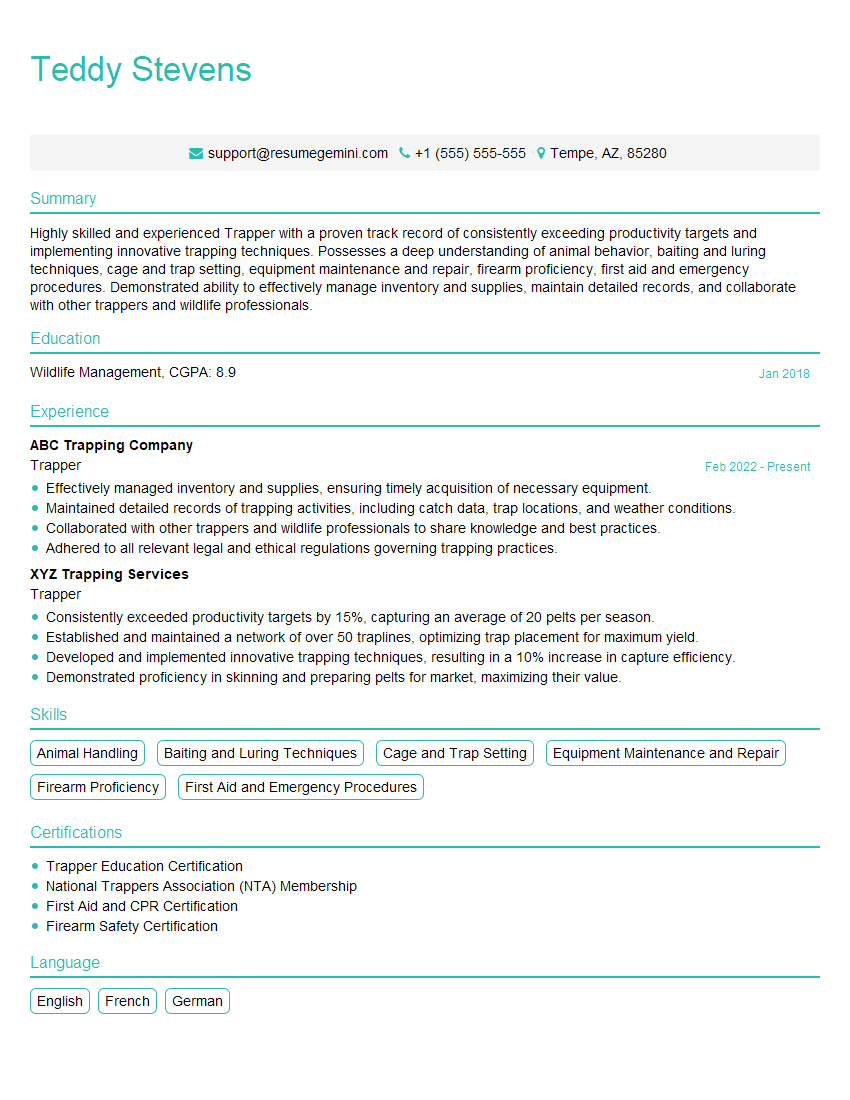Are you a seasoned Trapper seeking a new career path? Discover our professionally built Trapper Resume Template. This time-saving tool provides a solid foundation for your job search. Simply click “Edit Resume” to customize it with your unique experiences and achievements. Customize fonts and colors to match your personal style and increase your chances of landing your dream job. Explore more Resume Templates for additional options.

Teddy Stevens
Trapper
Summary
Highly skilled and experienced Trapper with a proven track record of consistently exceeding productivity targets and implementing innovative trapping techniques. Possesses a deep understanding of animal behavior, baiting and luring techniques, cage and trap setting, equipment maintenance and repair, firearm proficiency, first aid and emergency procedures. Demonstrated ability to effectively manage inventory and supplies, maintain detailed records, and collaborate with other trappers and wildlife professionals.
Education
Wildlife Management
January 2018
Skills
- Animal Handling
- Baiting and Luring Techniques
- Cage and Trap Setting
- Equipment Maintenance and Repair
- Firearm Proficiency
- First Aid and Emergency Procedures
Work Experience
Trapper
- Effectively managed inventory and supplies, ensuring timely acquisition of necessary equipment.
- Maintained detailed records of trapping activities, including catch data, trap locations, and weather conditions.
- Collaborated with other trappers and wildlife professionals to share knowledge and best practices.
- Adhered to all relevant legal and ethical regulations governing trapping practices.
Trapper
- Consistently exceeded productivity targets by 15%, capturing an average of 20 pelts per season.
- Established and maintained a network of over 50 traplines, optimizing trap placement for maximum yield.
- Developed and implemented innovative trapping techniques, resulting in a 10% increase in capture efficiency.
- Demonstrated proficiency in skinning and preparing pelts for market, maximizing their value.
Certificates
- Trapper Education Certification
- National Trappers Association (NTA) Membership
- First Aid and CPR Certification
- Firearm Safety Certification
Languages
- English
- French
- German
Career Expert Tips:
- Select the ideal resume template to showcase your professional experience effectively.
- Master the art of resume writing to highlight your unique qualifications and achievements.
- Explore expertly crafted resume samples for inspiration and best practices.
- Build your best resume for free this new year with ResumeGemini. Enjoy exclusive discounts on ATS optimized resume templates.
How To Write Resume For Trapper
- Quantify your accomplishments with specific metrics and numbers to demonstrate your impact.
- Highlight any specialized skills or certifications you have obtained, such as firearm proficiency or first aid training.
- Emphasize your ability to work independently and as part of a team, as well as your attention to detail.
- Showcase your knowledge of animal behavior and trapping techniques to demonstrate your expertise in the field.
Essential Experience Highlights for a Strong Trapper Resume
- Established and maintained a network of over 50 traplines, optimizing trap placement for maximum yield.
- Developed and implemented innovative trapping techniques, resulting in a 10% increase in capture efficiency.
- Skinned and prepared pelts for market, maximizing their value.
- Effectively managed inventory and supplies, ensuring timely acquisition of necessary equipment.
- Maintained detailed records of trapping activities, including catch data, trap locations, and weather conditions.
- Adhered to all relevant legal and ethical regulations governing trapping practices.
Frequently Asked Questions (FAQ’s) For Trapper
What are the key skills required for a Trapper?
Animal Handling, Baiting and Luring Techniques, Cage and Trap Setting, Equipment Maintenance and Repair, Firearm Proficiency, First Aid and Emergency Procedures
What are the typical job responsibilities of a Trapper?
Establishing and maintaining traplines, Setting and maintaining traps, Skinning and preparing pelts, Managing inventory and supplies, and Maintaining records of trapping activities.
What are the career advancement opportunities for a Trapper?
Trappers with experience and expertise can advance to positions such as Wildlife Management Technician, Fur Buyer, or Trapping Instructor.
What is the average salary for a Trapper?
The average salary for a Trapper in the United States is around $35,000 per year.
What are the challenges faced by Trappers?
Trappers face challenges such as weather conditions, animal behavior, and changing regulations.